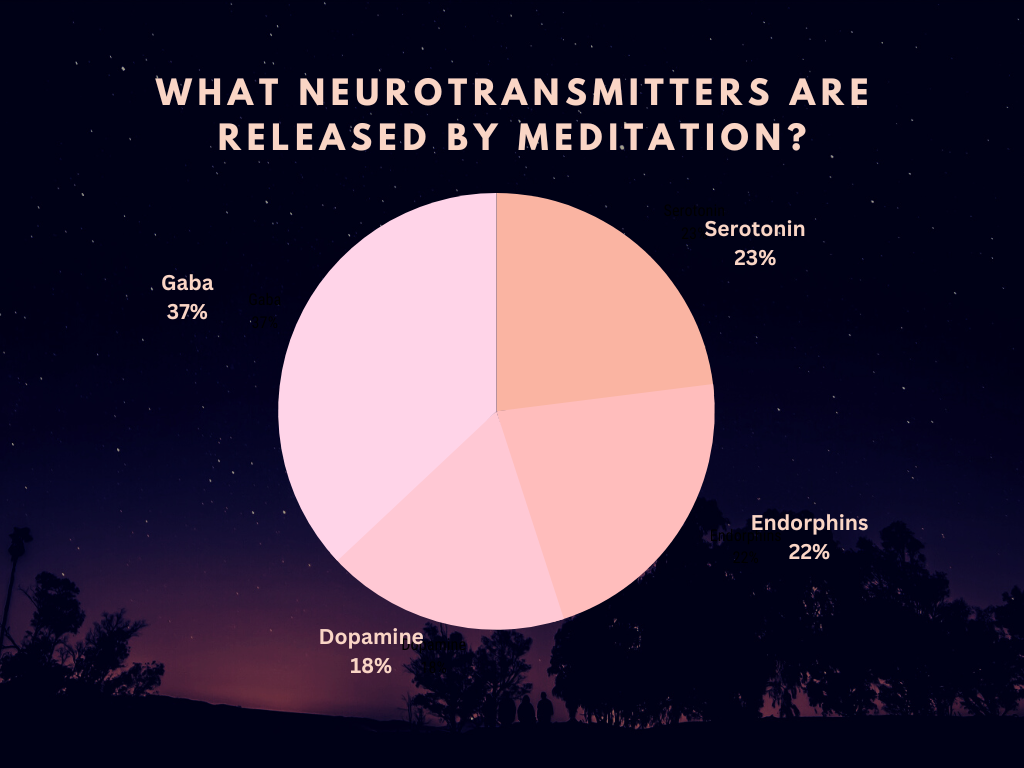We will be discussing “What chemicals are released when you meditate” in this blog in deep and the benefits of meditation on your health and mind.
Meditation has been used for centuries to promote relaxation, stress reduction, and overall well-being. What exactly happens in the body when you meditate? Meditation can result in the release of many chemicals that positively affect our mental and physical health.
Serotonin is one of the chemicals released during meditation. Serotonin, a neurotransmitter involved in mood regulation, can reduce anxiety and depression. Meditation can increase the amount of serotonin in our bodies, which can lead to happiness and contentment.
Many forms of meditation have been developed and established by many sage scientists from India since the time Patanjali was born, who is considered the Father of Yoga. According to Indian sources, he died in 2009. There are many meditation techniques, but the most well-known in the West are Mindful Meditation, Transcendental Meditation and Kundalini Meditation.
This organization revived the literature of yoga in this era again and made everyone aware of its benefits of it.

Oxytocin is another chemical that can be released during meditation. Because it plays a role in social bonding and other interpersonal relationships, oxytocin is commonly called the “love hormone”. It can be released through social interactions, physical touch and meditation. There have been positive results, such as reducing anxiety and stress, improving sleep quality, increasing trust and connection with others, and even increasing levels of stress and anxiety.
What chemicals are released when you meditate
Meditation can lead to endorphin release. These neurotransmitters are involved in pain relief, pleasure, and euphoria. While endorphins are released through physical activity, they can also be released when we meditate, especially if we focus on positive emotions and thoughts.

Meditation has been shown to increase neurotransmitters and hormones such as dopamine and GABA. This can contribute to a better physical and mental state.
Meditation can result in the release of many chemicals that can have beneficial effects on our mental and physical health. Meditation can be integrated into daily life to take advantage of chemical changes that can improve our well-being.
What happens chemically when you meditate?
Meditation can lead to a variety of chemical changes in your body that can improve your mental and physical health. These chemical changes may be caused by the relaxation response. This is when the mind and body are calmed down and relaxed.

Meditation reduces the activity of the sympathetic nervous system, which controls the “fight or flight” response. The body’s parasympathetic nervous system becomes more active as a result. This can lead to many physical changes including:
- A drop in heart rate and blood pressure
- A fall in the respiratory rate
- A decrease in stress hormones such as cortisol
- A greater blood flow to the brain
Meditation can lead to many brain chemicals, including:
- Serotonin is a neurotransmitter that regulates mood and can reduce anxiety and depression.
- Oxytocin is a hormone that helps in bonding and social connection. It can help reduce stress and anxiety and even improve sleep quality.
- Endorphins are neurotransmitters that help with pain relief and can cause feelings of pleasure or euphoria.
These chemical changes can have a variety of positive effects on your mental and physical well-being, including decreased stress and anxiety, better sleep, increased happiness, and greater contentment.
Can meditation release toxins?
Although meditation isn’t intended to remove toxins from the body specifically, it can have an impact on the body’s ability to eliminate them through the relaxation response. Relaxation is a state in which the body and mind are at ease. The body’s sympathetic nervous systems become less active during relaxation, which can result in a variety of physical changes that may contribute to better overall health and well-being.
A relaxation response can cause a reduction in heart rate and blood pressure. This can reduce strain on the cardiovascular system, and increase circulation. Improved circulation can improve blood flow and help remove toxins and oxygen from the cells.

Relaxation can also cause a decrease in respiratory rate. This can help reduce carbon dioxide and other harmful substances in the body. This could increase the body’s ability to eliminate toxins.
The relaxation response can also increase blood flow to the brain which can improve brain function. This can potentially help the body to eliminate toxins through its detoxification processes.
Meditation may have some effect on your body’s ability to eliminate toxins. However, meditation is not meant to replace proper nutrition, hydration and other healthy habits essential for overall health and well-being. If you have any concerns about toxic substances in your body or are having health problems, it is important to seek out a qualified healthcare professional.
What neurotransmitters are released by meditation?
Meditation can help release neurotransmitters from the brain that are involved with various functions, including mental and physical well-being.
Serotonin, a neurotransmitter involved in mood regulation, can reduce anxiety and depression. Meditation can increase the amount of serotonin in our bodies, which can lead to happiness and contentment.

Because it plays a role in social bonding and social connection, oxytocin is commonly referred to as the “love hormone”. It can be released through social interactions, physical touch and meditation. There have been positive results, such as reducing anxiety and stress, improving sleep quality, increasing trust and connection with others, and even increasing your ability to connect to other people.
Endorphins, neurotransmitters involved in pain relief, can also contribute to feelings such as pleasure and euphoria. Although endorphins are released by physical activity, they can also be released when we meditate, especially if we focus on positive emotions and thoughts.
Meditation has been shown to increase neurotransmitter production. Dopamine is a neurotransmitter that is involved in reward and motivation. GABA, on the other hand, is involved in relaxation and stress management. The hormone melatonin plays a role in sleep regulation. Meditation can increase the production of these hormones and neurotransmitters, which can have many positive effects on your mental and physical well-being.

Important to remember that neurotransmitter release is not the main goal of meditation. It is a side effect of the relaxation response that meditation produces. Meditation can induce relaxation, which can have many positive effects on mental and physical well-being.
Does meditation release trauma?
Meditation is a meditation practice that helps you focus your mind and create a sense of inner peace. Although it is not intended to release trauma, meditation can help you manage the symptoms of trauma such as anxiety and stress.
Consider an example of someone who has been in a car accident and suffered trauma. An individual who has been in a car accident may feel anxious and stressed. They may also experience feelings of sadness, anger and helplessness. These symptoms can be managed and healed by meditation.

Mindfulness meditation is a form of meditation that can be especially helpful for people like this. Mindfulness meditation is a way to pay attention to the moment and not judge. Mindfulness meditation can help people become more aware and compassionate about their thoughts and feelings.
When someone feels anxious driving or riding in a vehicle, they can practice mindfulness meditation. This involves focusing on the breath, noticing their thoughts, and not getting too caught up in them. It is possible to accept the experience as it is without trying to change it. This practice can help you to be more present and calm, and may even help you to manage your anxiety and stress.
For managing trauma, other forms of meditation such as loving-kindness mediation, which involves directing feelings of love and compassion towards yourself and others, can also be beneficial. This meditation can be especially helpful for people who have suffered trauma.
Meditation can be helpful in healing trauma. However, it should not replace professional treatment. It is crucial to seek the support of a qualified mental healthcare professional if you experience trauma symptoms. A qualified mental health professional can help identify the root causes of your symptoms, and create a customized treatment plan for you.
how to get rid of nightmares spiritually what chemicals are released when you meditate what chemicals are released when you meditate
what chemicals are released when you meditate
Are you ready to embark on a journey of brain rewiring and unleash your true potential? Look no further than Manthan Hub, the ultimate app for personal growth and transformation.
ManthanHub is a cutting-edge platform designed to help you rewire your brain, optimize your cognitive abilities, and achieve your goals with greater ease. Whether you’re seeking to enhance your focus, improve your memory, boost your creativity, or overcome limiting beliefs, Manthan Hub has you covered.
With our state-of-the-art brain rewiring techniques and comprehensive course offerings, you’ll have access to a wealth of knowledge and tools that empower you to reshape your brain’s neural pathways for optimal performance and well-being. Our courses are crafted by leading experts in the field of neuroscience, psychology, and personal development, ensuring that you receive the highest quality guidance and support on your transformative journey.
What sets ManthanHub apart is our user-friendly app interface, which makes it effortless to navigate through the courses, track your progress, and engage in interactive exercises and activities. You’ll have access to a variety of engaging multimedia content, including videos, audio exercises, guided meditations, and interactive quizzes, ensuring an immersive learning experience.
Join the thriving community of like-minded individuals on ManthanHub, where you can connect with fellow learners, exchange insights, and receive support and encouragement along your brain-rewiring journey. Our platform fosters a supportive and inspiring environment, where you can learn, grow, and thrive together.
Don’t wait any longer to unlock your brain’s true potential. Download ManthanHub today and embark on a transformative journey toward personal growth, enhanced cognitive abilities, and a life of limitless possibilities.
Remember, your brain has the power to change, adapt, and rewire itself. With Manthan Hub, you hold the key to unlocking your brain’s full potential. Start rewiring your brain today and watch yourself soar to new heights.
- Kundalini Yoga Benefits
- Can Ayurveda Cure Digestive Problems?
- Benefits of planting Tulsi at home
- Reasons behind why not eating onion and garlic?
- How to Cure Depression with Yoga
- Best ways to start your day positively
- 15 Tips to Make Your Diet Healthier
- Benefits of walking daily





